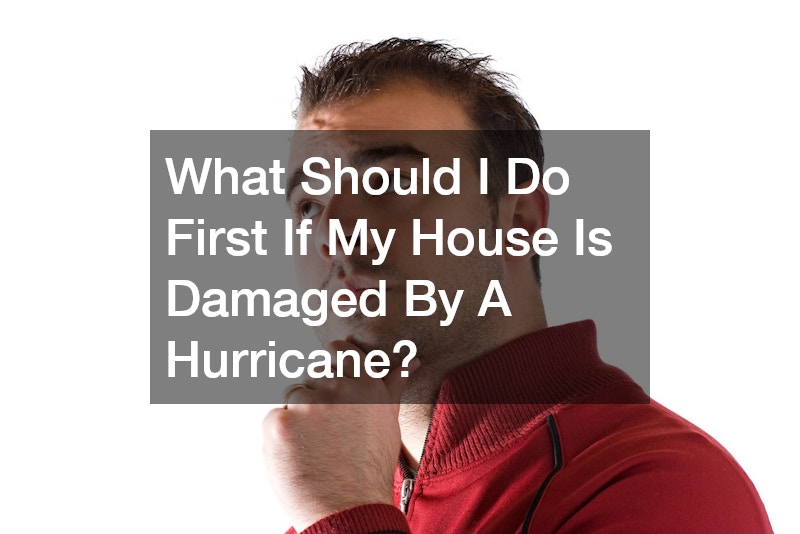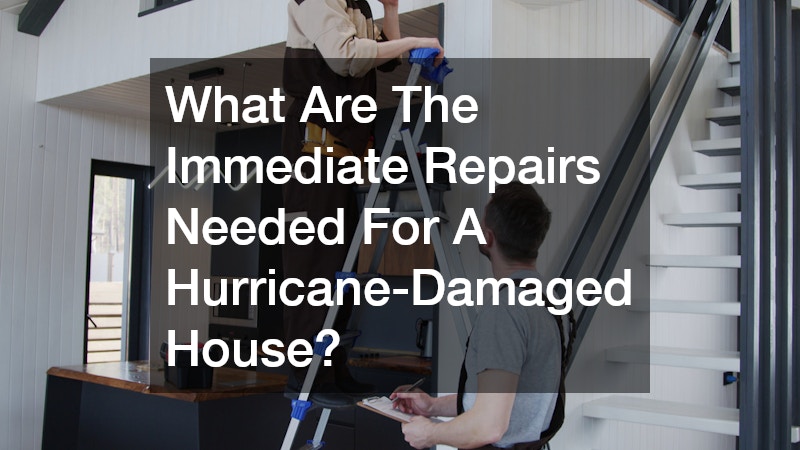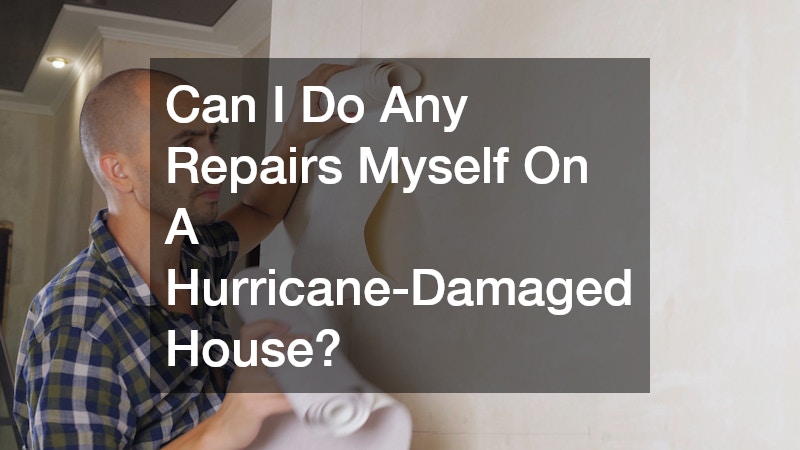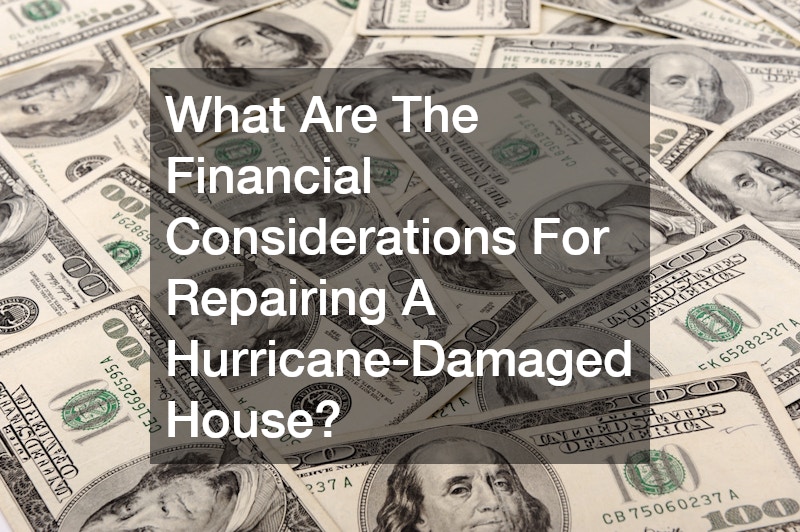Hurricanes can leave a trail of destruction that affects not only the structure of your home but also your sense of safety and security. A hurricane-damaged house often faces a combination of wind, water, and debris damage that requires immediate attention. Acting quickly after a storm is critical to prevent further deterioration and to begin the restoration process efficiently. Understanding the steps to take immediately can save both time and money while ensuring your home is restored safely. Being prepared and knowing the right actions to take can significantly reduce stress and help protect your family during the recovery process.
What Should I Do First If My House Is Damaged By A Hurricane?

Assessing The Immediate Safety
The first priority after returning to a hurricane-damaged house is to ensure that it is safe for entry. Structural damage, fallen trees, and loose power lines can pose serious hazards. Avoid entering rooms that appear unstable and be alert for hidden dangers such as weak floors or collapsed ceilings. Safety comes first, and personal protective equipment may be necessary.
Securing Your Property
Once the immediate risks are evaluated, it is crucial to secure your hurricane-damaged house. Boarding up broken windows, reinforcing doors, and covering exposed roof areas with tarps can prevent further water intrusion. This step also helps deter theft and vandalism while you begin the repair process.
Documenting The Damage
Documenting the damage to your property is essential for insurance purposes and repair planning. Take detailed notes, photographs, and videos of every affected area. Ensure that you capture both structural damage and contents that have been ruined by the storm.
Contacting Your Insurance Provider
Informing your insurance company about the damage is a vital step in recovering financially from a hurricane-damaged house. Prompt notification allows adjusters to assess the damage and begin processing claims. Keep all correspondence documented to streamline the claims process.
Planning Temporary Accommodations
If your hurricane-damaged house is uninhabitable, it is necessary to arrange temporary housing. Hotels, rentals, or staying with friends and family may be required while repairs are underway. Coordinating these arrangements early reduces stress and ensures the safety of your household.
How Do I Document Damages To My Hurricane-Damaged House?
Taking Photographs And Videos
Photographs and videos are the most concrete way to document damage. Capture wide-angle shots to show the full extent and close-ups to detail specific damage. Multiple angles provide a clearer understanding for insurance adjusters and restoration companies.
Keeping Detailed Notes
Along with visuals, maintaining detailed notes helps explain the timeline and nature of the damage. Include descriptions of affected rooms, damaged materials, and any observed hazards. These notes serve as an additional record to support your claims.
Using Digital Tools For Inventory
Digital tools and apps can assist in tracking personal belongings and property damage. Creating a digital inventory allows for easy organization and can speed up claims processing. This is especially useful if items are lost or destroyed beyond recognition.
Collecting Official Damage Assessments
In some cases, professional inspectors may be required to provide an official assessment of your hurricane-damaged house. These reports can validate your insurance claim and help identify structural issues that may not be immediately visible.
Organizing Documentation For Insurance Claims
Once all documentation is collected, organize it into a comprehensive file. Separate photographs, notes, invoices, and official assessments for easy access. A well-organized record ensures that your claim is processed smoothly and efficiently.
How Can I Tell If My House Is Safe To Return To After A Hurricane?
Inspecting Structural Integrity
Before moving back in, a thorough inspection of your hurricane-damaged house is crucial. Check for weakened beams, cracked foundations, or sagging roofs. Consulting a local foundation repair service can provide a professional assessment and recommendations for structural repairs.
Checking For Gas Leaks
A hurricane can damage gas lines, creating significant safety risks. Inspect for the smell of gas or hissing sounds, and contact your utility company immediately if a leak is suspected. Avoid using open flames or electrical switches until the area is deemed safe.
Verifying Electrical Systems
Flooded or damaged wiring can cause electrical hazards. Ensure that power is turned off before inspecting, and hire certified electricians if there is any doubt about the integrity of your electrical systems. Proper evaluation prevents fires and injury.
Evaluating Water Damage And Mold
Water intrusion is one of the most common problems in a hurricane-damaged house. Standing water, leaks, and humidity can lead to mold growth if not addressed promptly. Hiring a water remediation service or water mitigation specialist can prevent long-term health issues and structural damage.
Consulting With Professional Inspectors
Professional inspectors, including structural engineers and a restoration company, can provide comprehensive assessments. Their expertise ensures that you have a clear understanding of the safety and repair needs of your hurricane-damaged house.
What Are The Immediate Repairs Needed For A Hurricane-Damaged House?

Tarping The Roof
A damaged roof is a major vulnerability in a hurricane-damaged house. Temporary tarping prevents further water intrusion and damage to the interior. Roof repair professionals can provide temporary solutions until permanent roof replacement is scheduled.
Boarding Up Broken Windows
Broken windows allow wind, rain, and debris to enter your home, worsening damage. Boarding them up secures your hurricane-damaged house and protects your belongings. Restoration companies often offer emergency boarding services as part of their storm damage response.
Addressing Water Intrusion
Standing water in basements or crawl spaces can cause severe problems. Water mitigation and basement waterproofing services are essential to remove water safely and prevent mold growth. Immediate action can save structural materials and reduce repair costs.
Stabilizing Structural Elements
Shoring up weakened walls, beams, and foundations is necessary to prevent collapse. Professional local foundation repair services provide the equipment and expertise to stabilize your hurricane damaged house safely.
Restoring Power Safely
Electrical systems should only be restored once they are inspected and deemed safe. Power restoration prevents hazards and allows you to begin additional repairs efficiently. Temporary generators may be needed in some cases.
How Do I Choose A Reliable Contractor For Repairs?
Checking Credentials And Licenses
Ensure that contractors working on your hurricane-damaged house have valid licenses and certifications. This protects you from unqualified or fraudulent services and ensures compliance with building codes.
Requesting References And Reviews
Ask for references from previous clients and research online reviews. Verified experiences from past customers can provide insight into a contractor’s reliability and quality of work.
Comparing Quotes
Obtain multiple quotes to understand the scope of work and fair pricing. Comparing estimates ensures that you are making an informed financial decision while maintaining quality standards.
Understanding Contract Terms
Review contracts carefully, including timelines, materials, and payment schedules. A clear agreement protects both parties and prevents misunderstandings during the repair process.
Avoiding Scams And Fraudulent Contractors
Unfortunately, disasters attract opportunists. Be cautious of contractors who demand large upfront payments or offer suspiciously low prices. Using reputable restoration companies reduces the risk of fraud.
Can I Do Any Repairs Myself On A Hurricane-Damaged House?

Identifying Safe DIY Repairs
Some repairs, such as clearing debris or minor cleanup, may be safe for homeowners. Avoid working on structural elements or electrical systems without professional guidance.
Essential Tools And Supplies
Basic tools such as hammers, saws, tarps, and protective gear are necessary for safe DIY repairs. Local equipment rental services can provide temporary access to specialized tools without a large investment.
After clearing debris and assessing damage, you may need to dispose of damaged materials safely. Many homeowners rely on dumpster rental companies to handle large amounts of debris efficiently. Renting a dumpster ensures that cleanup is organized and prevents further hazards around your hurricane-damaged house.
Online Resources And Tutorials
Many online guides offer step-by-step instructions for minor repairs. Video tutorials can help you navigate cleanup, temporary fixes, and protective measures safely.
Precautionary Measures For DIY Repairs
Always prioritize safety by wearing protective gear, shutting off utilities, and assessing hazards before attempting repairs. Careless actions can worsen damage or cause personal injury.
When To Hire A Professional
For structural repairs, roof replacement, electrical systems, and water remediation, hiring licensed professionals is essential. Their expertise ensures that your hurricane-damaged house is restored properly and safely.
What Materials Are Best For Rebuilding A House Prone To Hurricane Damage?
Choosing Impact-Resistant Roofing
High-quality roofing materials that resist wind and debris reduce future damage. Impact-resistant shingles or metal roofing can provide long-term protection for your hurricane-damaged house.
Selecting Durable Siding
Vinyl, fiber cement, or reinforced composite siding withstands harsh weather conditions. Durable siding helps maintain the structural integrity of your home and reduces ongoing maintenance costs.
Installing Storm-Proof Windows And Doors
Hurricane-proof windows and reinforced doors protect against wind, flying debris, and water intrusion. This is a critical investment in safeguarding your property against future storms.
Flood-Resistant Flooring Options
Water-resistant flooring such as tile, vinyl, or sealed concrete minimizes damage from flooding. Selecting the right flooring materials is especially important in basements and lower levels prone to water intrusion.
Reinforcing Structural Components
Steel reinforcements, hurricane straps, and concrete reinforcements enhance the durability of your hurricane-damaged house. These measures help the home withstand strong winds and reduce future repair needs.
How Can I Prevent Future Hurricane Damage To My House?
Implementing Landscaping Strategies
Strategically placed trees, shrubs, and grading can divert wind and water away from your home. Proper landscaping acts as a natural buffer for your hurricane-damaged house.
Upgrading To A Hurricane-Proof Exterior
Reinforced roofing, siding, and storm shutters strengthen your home’s exterior. These upgrades reduce vulnerability and may lower insurance premiums.
Installing Surge Protection Systems
Electrical surges caused by storms can damage appliances and electronics. Surge protection systems safeguard your property and reduce potential repair costs.
Regular Home Maintenance
Routine inspections, gutter cleaning, and minor repairs keep your home in optimal condition. Consistent maintenance reduces the risk of severe damage during future hurricanes.
Establishing A Hurricane Preparedness Plan
Developing an emergency plan ensures that your family knows evacuation routes, emergency contacts, and safety protocols. Preparation minimizes stress and enhances safety when storms approach.
What Are The Financial Considerations For Repairing A Hurricane-Damaged House?

Estimating Repair Costs
Understanding the financial impact of repairs helps in budgeting effectively. Roof replacement, water remediation, and structural repairs can be significant investments in a hurricane-damaged house.
Understanding Insurance Coverage
Review your homeowner’s insurance policy to determine coverage limits, deductibles, and exclusions. Proper knowledge ensures you maximize your claim benefits after a hurricane.
Exploring Government Assistance Programs
Local and federal disaster assistance programs may provide financial relief. FEMA, community development grants, and disaster loans are often available to homeowners affected by hurricanes.
Budgeting For Upgrades And Future Protection
In addition to repairs, allocate funds for storm-resistant upgrades. Investing in long-term protection reduces future costs and strengthens your hurricane-damaged house.
Managing Cash Flow And Expenses
Balancing immediate repairs, insurance reimbursements, and temporary accommodations requires careful planning. Tracking expenses and payments keeps the restoration process organized.
Where Can I Find Additional Resources And Assistance For Hurricane Recovery?
Local Government And Community Programs
Municipal and county offices often provide information, emergency services, and repair assistance. Engaging local authorities ensures you receive timely support for your hurricane-damaged house.
Non-Profit Organizations And Aid Groups
Non-profit organizations can help with temporary housing, cleanup, and restoration. Groups such as the Red Cross and community aid networks are invaluable in recovery efforts.
Online Guides And Tutorials
Numerous online resources offer guidance on cleanup, DIY repairs, and navigating insurance claims. These platforms can supplement professional help and provide practical tips.
Support Networks And Forums
Homeowner forums and social media groups connect those affected by hurricanes. Sharing experiences and advice helps you make informed decisions during the restoration of your hurricane-damaged house.
Professional Consulting Services
Restoration companies and contractors provide specialized advice on repairs, storm damage mitigation, and structural reinforcement. Consulting professionals ensures your home is restored efficiently and safely.
Recovering from a hurricane-damaged house is a challenging process that requires immediate action, careful planning, and professional guidance. From securing your property and documenting damage to performing repairs and considering long-term upgrades, every step is crucial. Engaging local foundation repair services, water remediation experts, and restoration companies ensures your home is restored safely and effectively. Proper preparation, resilient materials, and strategic planning not only repair the damage but also safeguard your home against future storms. By taking decisive action immediately, homeowners can minimize losses, protect their families, and restore their hurricane-damaged house to a safe and comfortable living environment. Taking the time to follow these steps thoroughly can make the difference between a temporary setback and a long-term recovery.



